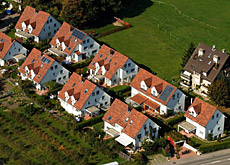Are family killings a result of gender issues?

A man kills his child or wife in their house before turning the gun on himself – this has happened at least ten times in the past year in Switzerland.
Each time, newspaper headlines have spoken of a domestic drama but such tragedies may have been caused by a man’s inability to deal with his perceived failure as the family’s principal breadwinner.
The latest tragedy took place in Wangen near Olten earlier this month. A 43-year-old man shot his 14-year-old son dead at home before killing himself.
His wife came home from gymnastics training to find two of her family members lying in pools of blood. Her other son survived the bloodbath as he was on a course abroad.
Police in Solothurn said that the motive for the murder-suicide was unclear.
However, according to the tabloid Blick, the father of two was suffering from stress stemming from a new job.
The day before the crime, the man had apparently been in talks with his superior and had decided to leave his position before completing the probation period.
In the same report, it was revealed that the dead man was a weapons collector and sports shooter.
Conservatism
Brigitte Schnegg, director of the Interdisciplinary Centre for Women and Gender Research at Bern University, says such tragedies could be the result of a social malaise that affects middle-class men across Switzerland – the pressure to be seen as the “man of the house”, who alone is responsible for bringing home the bacon.
“The conservative streak running through Switzerland is very, very strong,” she stressed.
While wanting to avoid stereotypes, Schnegg said that a significant number of these men still go home from work at lunchtime to eat a meal prepared by their wives.
“Such a man likes to keep up appearances, to show that everything is in its place, that his children don’t have to go to a crèche because he earns enough for his wife to stay at home,” she said.
She added that it was still typical within the Swiss middle-class that the financial burden of raising a family fell mainly on the man’s shoulders. This could lead to stress, if his performance did not measure up in his eyes.
Women too suffered from similar pressures, especially if they were single parents and had the double burden of combining a career with looking after the children.
“But in comparison you hear of fewer women resorting to such violent means as a solution,” the academic said.
And herein lies the difference: men are quicker to take up arms. Schnegg says this is something that is facilitated by the fact that army-issued guns are stored at home thanks to the militia system, where technically every Swiss man is a soldier.
Schnegg finds this recourse particularly worrying.
“It shows that in certain circles, especially in small towns and in the countryside, the gun has a symbolic value. This hypothetically combined with not being able to deal with a conflict situation is dangerous,” she said.
Certain middle-class men found it hard to cope with a loss of face, much more so than those belonging to the lower class, and of course compared with women.
Schnegg was surprised that the coverage in the Swiss media of the Olten murder and similar cases invariably referred to a “family drama”.
“Why was it not called “male violence”? We know that statistically speaking, family life is the most dangerous but this issue is taboo for us,” Schnegg said.
As to why the subject was avoided, Schnegg replied that in the past 30 years, while an intensive discussion on the role of women in society had taken place, leading to their emancipation, a similar debate about men and where they fit in hadn’t.
“There has been less movement for men, placing them under a specific pressure; if they do address these issues, they are called ‘softies’,” she explained.
Ambivalent roles
Traditional roles too have also become more ambivalent and some men find this difficult to digest and to cope with.
That’s a view held by Andi Geu, one of the founders of a new men’s organisation, männer.ch, whose goal is to lobby for male equality on the political level.
“[These tragedies] are an indication that more support is needed for men. There are some traditional messages about what it means to be a man that are not really helpful if you are in a difficult situation.”
“[For example] that you have to cope with everything on your own, that you have to be tough and work through everything on your own, [or] that you should not get help when you are in trouble,” Geu said.
Geu added that things were not going well for a lot of men socially and economically.
“They have a lot of pressure at work, and if you look at health and crime statistics you see that a lot of men are in a worse shape than women… Having so many men under pressure also affects their wives and children as well.”
Self-destruction
The recent series of murder-suicides had at least one element in common: the men killed family members who happened to be nearby before taking their own lives. Why was that?
“If a woman finds herself in a conflict situation, she is more likely to turn to self-destructive behaviour, such as becoming anorexic, than destroying her family,” suggested Schnegg.
She added that one does hear of cases where women have killed members of their family in much the same way and in similar circumstances as the Olten murder but that they were few and far between.
For Schnegg, it is high time that the stress-coping abilities of both men and women are extensively researched in Switzerland.
“Gender research is still not taken seriously here, not like in the United States, England and Holland – it’s still seen as ‘feminist stuff’,” she said.
swissinfo, Faryal Mirza
At least four men have killed family members during the first half of 2005:
June 21, 2005 – A father kills his son near Olten before committing suicide.
June 7, 2005 – 59-year-old man kills wife and then stabs himself to death in Schwyz.
May 30, 2005 – A father of two kills his wife and children before committing suicide.
March 30, 2005 – A 47-year-old man shoots his wife and two daughters dead before killing himself.

In compliance with the JTI standards
More: SWI swissinfo.ch certified by the Journalism Trust Initiative

You can find an overview of ongoing debates with our journalists here. Please join us!
If you want to start a conversation about a topic raised in this article or want to report factual errors, email us at english@swissinfo.ch.